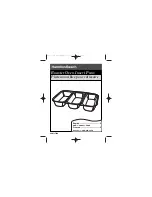
8
Add soft or quick cooking vegetables such
as mushrooms, tomatoes, beans or corn in
the last half hour of cooking.
Thicken towards end of cooking by
stirring in a little cornflour blended with
water, or plain flour blended with
margarine or butter. Alternatively, coat
meat in plain flour before frying (extra oil
may be needed)
Basting
Recommended temperature probe
setting 2
The Pan Tilt lever makes basting easy by
allowing the juices to drain to one side of
the pan.
Reduce the temperature to prevent fat
and juices from splattering.
Position the Pan Tilt Lever and allow the
juices to drain to the lower end of the
frypan.
Spoon the juices over the food as desired.
Roasting
Recommended temperature probe setting
4 – 10
Meat and poultry
The Banquet Frypan is ideal for roasting
meat and poultry, as the meat retains the
flavour and juices.
The Banquet Frypan’s domed lid provides
ample room for larger joints of meat and
poultry.
Preheat the frypan, on setting 10. Fattier
joints of meat require no oil. Use only a
small amount for less fatty joints.
Brown and seal the meat on all sides.
Position the lid.
After browning, turn the dial to setting
4 – 6, cooking the meat as desired.
Turn the meat during cooking.
Once the meat is cooked, set aside and
cover with foil, whilst the gravy is
prepared from the juice in the frypan.
Vegetables
Cut into even sized pieces.
Add to the frypan 40 – 65 minutes before
serving.
For crisper vegetables, remove the meat
and increase the heat for the last few
minutes of cooking.
Roasting Times
The following times are for dishes that are
well done.To suit your personal taste,
these times can be reduced.
Pork
30 – 40 minutes/500g after browning
Veal
30 – 40 minutes/500g after browning
Lamb
25 – 30 minutes/500g after browning
Chicken
25 – 30 minutes/500g after browning
Beef
25 – 30 minutes/500g after browning
Recommended roasting times (well done)
Note:
As the frypan is
thermostatically
controlled, it will cycle
on and off during the
cooking process.


































